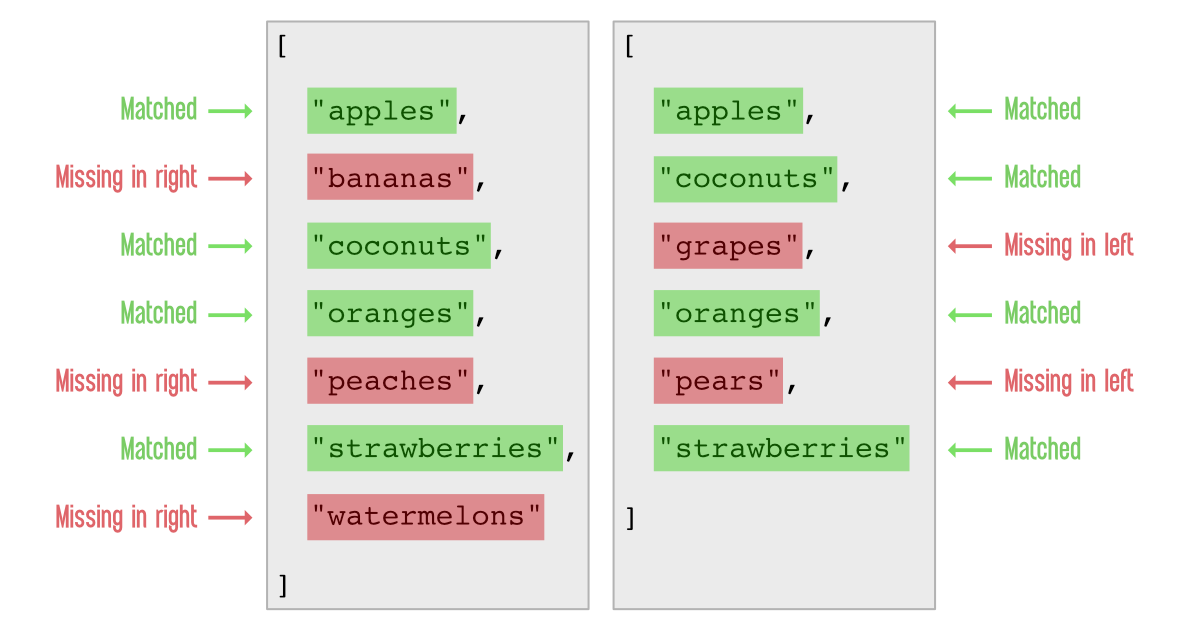Super efficiently compares two sorted lists (arrays, strings, anything that is iterable actually).
npm install compare-lists --saveimport { compareLists } from "compare-lists";Say you have two sorted lists of filenames and you need to know which files exist in the left list, which exist in the right list, and which exist in both lists.
const leftList = [
"documents/apples.txt",
"documents/funny-cats.mp4",
"documents/funny-dogs.avi",
"trash/linux.iso",
"trash/zebras.doc"
];
const rightList = [
"documents/apples.txt",
"documents/funny-cats.mp4",
"documents/taxes.doc",
"trash/linux.iso",
"trash/zebras.doc"
];Just call compareLists passing both the lists, a function to compare items in each list and handlers for any events that you're interested in.
compareLists({
left: leftList,
right: rightList,
compare: (left, right) => left.localeCompare(right),
onMatch: value => console.log(`"${value}" is found in both lists`),
onMissingInLeft: right =>
console.log(`"${right}" is missing in the left list`),
onMissingInRight: left =>
console.log(`"${left}" is missing in the right list`)
});The output will be:
"documents/apples.txt" is found in both lists
"documents/funny-cats.mp4" is found in both lists
"documents/funny-dogs.avi" is missing in the right list
"documents/taxes.doc" is missing in the left list
"trash/linux.iso" is found in both lists
"trash/zebras.doc" is found in both lists
That's the basics!
Alternatively, you can ask for a "report" instead of handling events. Just keep in mind this will use more memory than simply handling events.
const report = compareLists({
left: leftList,
right: rightList,
compare: (left, right) => left.localeCompare(right),
returnReport: true
});
console.log(JSON.stringify(report, null, " "));{
"missingInLeft": ["documents/taxes.doc"],
"missingInRight": ["documents/funny-dogs.avi"],
"matches": [
["documents/apples.txt", "documents/apples.txt"],
["documents/funny-cats.mp4", "documents/funny-cats.mp4"],
["trash/linux.iso", "trash/linux.iso"],
["trash/zebras.doc", "trash/zebras.doc"]
]
}The left and right lists do not need to be the same type as each other. Just remember the items still need to by sorted by the field you are comparing on.
const leftList = [{ name: "Morty Smith" }, { name: "Rick Sanchez" }];
const rightList = ["Morty Smith", "Mr. Poopy Butthole"];
const report = compareLists({
left: leftList,
right: rightList,
compare: (left, right) => left.name.localeCompare(right),
returnReport: true
});
console.log(JSON.stringify(report, null, " "));Will output:
{
"missingInLeft": ["Mr. Poopy Butthole"],
"missingInRight": [{ "name": "Rick Sanchez" }],
"matches": [[{ "name": "Morty Smith" }, "Morty Smith"]]
}The library works with any objects that implement the iterable protocol, including arrays, strings, maps, etc.
Here is an example of comparing characters in two strings:
const left = "abcdef";
const right = "abcxyz";
const report = compareLists({
left,
right,
compare: (left, right) => left.localeCompare(right)
});
console.log(JSON.stringify(report, null, " "));Will output:
{
"missingInLeft": ["x", "y", "z"],
"missingInRight": ["d", "e", "f"],
"matches": [
["a", "a"],
["b", "b"],
["c", "c"]
]
}There is also a handy compareIterators function if you need it.
Don't forget the values need to be in ascending order!
import { compareIterators } from "compare-lists";
const leftIterator = function*() {
yield "a";
yield "b";
yield "c";
};
const rightIterator = function*() {
yield "a";
yield "c";
yield "d";
};
const report = compareIterators({
left: leftIterator(),
right: rightIterator(),
compare: (left, right) => left.localeCompare(right),
returnReport: true
});
console.log(JSON.stringify(report, null, " "));Will output:
{
"missingInLeft": ["d"],
"missingInRight": ["b"],
"matches": [
["a", "a"],
["c", "c"]
]
}Got an issue or a feature request? Log it.
Pull-requests are also welcome. 😸
